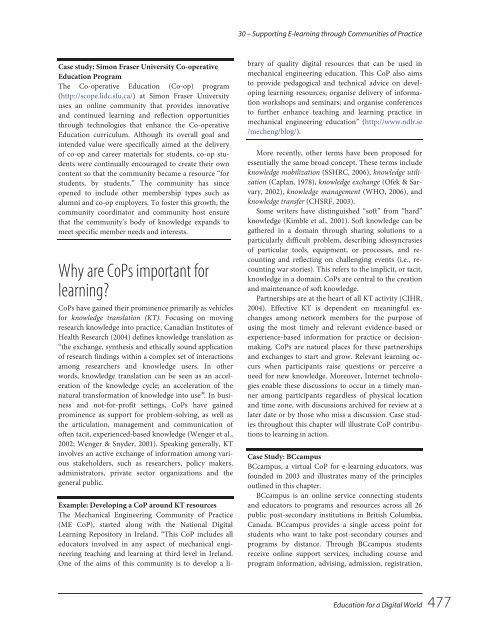Education for a Digital World Advice, Guidelines and Effective Practice from Around Globe, 2008a
Education for a Digital World Advice, Guidelines and Effective Practice from Around Globe, 2008a
Education for a Digital World Advice, Guidelines and Effective Practice from Around Globe, 2008a
Create successful ePaper yourself
Turn your PDF publications into a flip-book with our unique Google optimized e-Paper software.
30 – Supporting E-learning through Communities of <strong>Practice</strong><br />
Case study: Simon Fraser University Co-operative<br />
<strong>Education</strong> Program<br />
The Co-operative <strong>Education</strong> (Co-op) program<br />
(http://scope.lidc.sfu.ca/) at Simon Fraser University<br />
uses an online community that provides innovative<br />
<strong>and</strong> continued learning <strong>and</strong> reflection opportunities<br />
through technologies that enhance the Co-operative<br />
<strong>Education</strong> curriculum. Although its overall goal <strong>and</strong><br />
intended value were specifically aimed at the delivery<br />
of co-op <strong>and</strong> career materials <strong>for</strong> students, co-op students<br />
were continually encouraged to create their own<br />
content so that the community became a resource “<strong>for</strong><br />
students, by students.” The community has since<br />
opened to include other membership types such as<br />
alumni <strong>and</strong> co-op employers. To foster this growth, the<br />
community coordinator <strong>and</strong> community host ensure<br />
that the community’s body of knowledge exp<strong>and</strong>s to<br />
meet specific member needs <strong>and</strong> interests.<br />
Why are CoPs important <strong>for</strong><br />
learning?<br />
CoPs have gained their prominence primarily as vehicles<br />
<strong>for</strong> knowledge translation (KT). Focusing on moving<br />
research knowledge into practice, Canadian Institutes of<br />
Health Research (2004) defines knowledge translation as<br />
“the exchange, synthesis <strong>and</strong> ethically sound application<br />
of research findings within a complex set of interactions<br />
among researchers <strong>and</strong> knowledge users. In other<br />
words, knowledge translation can be seen as an acceleration<br />
of the knowledge cycle; an acceleration of the<br />
natural trans<strong>for</strong>mation of knowledge into use”. In business<br />
<strong>and</strong> not-<strong>for</strong>-profit settings, CoPs have gained<br />
prominence as support <strong>for</strong> problem-solving, as well as<br />
the articulation, management <strong>and</strong> communication of<br />
often tacit, experienced-based knowledge (Wenger et al.,<br />
2002; Wenger & Snyder, 2001). Speaking generally, KT<br />
involves an active exchange of in<strong>for</strong>mation among various<br />
stakeholders, such as researchers, policy makers,<br />
administrators, private sector organizations <strong>and</strong> the<br />
general public.<br />
Example: Developing a CoP around KT resources<br />
The Mechanical Engineering Community of <strong>Practice</strong><br />
(ME CoP), started along with the National <strong>Digital</strong><br />
Learning Repository in Irel<strong>and</strong>. “This CoP includes all<br />
educators involved in any aspect of mechanical engineering<br />
teaching <strong>and</strong> learning at third level in Irel<strong>and</strong>.<br />
One of the aims of this community is to develop a library<br />
of quality digital resources that can be used in<br />
mechanical engineering education. This CoP also aims<br />
to provide pedagogical <strong>and</strong> technical advice on developing<br />
learning resources; organise delivery of in<strong>for</strong>mation<br />
workshops <strong>and</strong> seminars; <strong>and</strong> organise conferences<br />
to further enhance teaching <strong>and</strong> learning practice in<br />
mechanical engineering education” (http://www.ndlr.ie<br />
/mecheng/blog/).<br />
More recently, other terms have been proposed <strong>for</strong><br />
essentially the same broad concept. These terms include<br />
knowledge mobilization (SSHRC, 2006), knowledge utilization<br />
(Caplan, 1978), knowledge exchange (Ofek & Sarvary,<br />
2002), knowledge management (WHO, 2006), <strong>and</strong><br />
knowledge transfer (CHSRF, 2003).<br />
Some writers have distinguished “soft” <strong>from</strong> “hard”<br />
knowledge (Kimble et al., 2001). Soft knowledge can be<br />
gathered in a domain through sharing solutions to a<br />
particularly difficult problem, describing idiosyncrasies<br />
of particular tools, equipment, or processes, <strong>and</strong> recounting<br />
<strong>and</strong> reflecting on challenging events (i.e., recounting<br />
war stories). This refers to the implicit, or tacit,<br />
knowledge in a domain. CoPs are central to the creation<br />
<strong>and</strong> maintenance of soft knowledge.<br />
Partnerships are at the heart of all KT activity (CIHR,<br />
2004). <strong>Effective</strong> KT is dependent on meaningful exchanges<br />
among network members <strong>for</strong> the purpose of<br />
using the most timely <strong>and</strong> relevant evidence-based or<br />
experience-based in<strong>for</strong>mation <strong>for</strong> practice or decisionmaking.<br />
CoPs are natural places <strong>for</strong> these partnerships<br />
<strong>and</strong> exchanges to start <strong>and</strong> grow. Relevant learning occurs<br />
when participants raise questions or perceive a<br />
need <strong>for</strong> new knowledge. Moreover, Internet technologies<br />
enable these discussions to occur in a timely manner<br />
among participants regardless of physical location<br />
<strong>and</strong> time zone, with discussions archived <strong>for</strong> review at a<br />
later date or by those who miss a discussion. Case studies<br />
throughout this chapter will illustrate CoP contributions<br />
to learning in action.<br />
Case Study: BCcampus<br />
BCcampus, a virtual CoP <strong>for</strong> e-learning educators, was<br />
founded in 2003 <strong>and</strong> illustrates many of the principles<br />
outlined in this chapter.<br />
BCcampus is an online service connecting students<br />
<strong>and</strong> educators to programs <strong>and</strong> resources across all 26<br />
public post-secondary institutions in British Columbia,<br />
Canada. BCcampus provides a single access point <strong>for</strong><br />
students who want to take post-secondary courses <strong>and</strong><br />
programs by distance. Through BCcampus students<br />
receive online support services, including course <strong>and</strong><br />
program in<strong>for</strong>mation, advising, admission, registration,<br />
<strong>Education</strong> <strong>for</strong> a <strong>Digital</strong> <strong>World</strong> 477


















